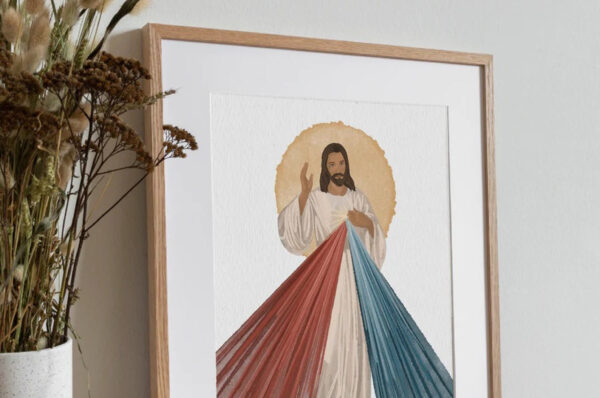Suffering. Every human being experiences it at some point in this life. Rich or poor, old or young, male or female, it makes no exceptions. Grief, disease, anxiety, guilt, hunger — suffering is as diverse as the human population, as well.
For millennia, human beings have struggled with the existence of suffering and its purpose. Some cultures face it in a masochistic manner, while others try to ignore its existence. Many view it as a punishment.
For Christians, however, suffering plays a strong role in our faith. After all, we believe that God incarnate suffered and died for our salvation. For Catholics especially, we believe that our own suffering is transformed and given meaning through the suffering of Jesus Christ.
Want more Radiant? Sign up for our weekly newsletter!
Jesus himself knew that his followers would suffer. He told us, “whoever does not take up his cross and follow after me is not worthy of me. Whoever finds his life will lose it, and whoever loses his life for my sake will find it” (Mt 10:38-39). Life in a fallen world is not easy. Every one of us has a cross to carry. A cross I have carried for nearly half my life is a cancer diagnosis. Some of those years have been more difficult than others. However, with much time, prayer and guidance from faithful people God has put in my life, I find meaning and a purpose for my suffering.
When I was first diagnosed with lymphoma, I struggled with the new normal of my life that included doctor’s appointments, medication, and trips to the hospital for phototherapy treatment. Phototherapy uses UVA light to kill the cancer cells forming plaques on my skin. It made me feel sick, and I struggled to keep my grades up in school. Also looming over me was the fear that comes with knowing your vulnerability. This disease could advance enough that I would die, and I longed to have as much energy and hope for the future as my peers. I cried out to God for help, as my cross seemed so heavy.
On Good Friday, I had a phototherapy treatment. As usual, I stripped off my clothes, stepped into the light booth and held my arms out in a cruciform position. As the UVA light came on, it suddenly hit me: On the first Good Friday, Jesus had been stripped and hung in a cruciform position. I was sharing in his Cross in a very physical way through this treatment. Moreover, light was being used to heal my cancer. In a deeper way, the light of the world himself had suffered and died on the cross to heal my soul. I was so overcome that tears leaked from my eyes during that treatment session — tears of love, peace and gratitude. At that moment, I accepted my cross. My suffering had been given new meaning.
However, God was not done teaching me more about suffering. While my lymphoma stabilized for several years with easier oral or topical treatments that could be done at home, in 2020 it suddenly got much worse. Open tumors grew all over my body, and I had to undergo many rounds of chemotherapy, radiation and eventually a stem-cell transplant in 2022. During this time, Christ drew me deeper into his suffering.
As Catholics, we believe that the death of Jesus Christ was not a random event in history. It was a sacrifice that saved us from sin. The Catechism of the Catholic Church instructs us:
“This sacrifice is unique; it completes and surpasses all other sacrifices. First, it is a gift from God the Father himself, for the Father handed his Son over to sinners in order to reconcile us with himself. At the same time, it is the offering of the Son of God made man, who in freedom and love offered his life to the Father through the Holy Spirit in reparation for our disobedience” (No. 614).
Jesus offered his life out of love for us and for his Father. His suffering had a purpose: our salvation. Likewise, our suffering can be offered as a participation in his sacrifice:
“The cross is the unique sacrifice of Christ, the ‘one mediator between God and men’. But because in his incarnate divine person he has in some way united himself to every man, ‘the possibility of being made partners, in a way known to God, in the paschal mystery’ is offered to all men” (CCC, No. 618).
When we take up our cross and follow Christ, we can offer the suffering to God to use as he wills. In respect to my own suffering through cancer, I had not yet considered the sacrificial prayer it could be for others.
While undergoing chemotherapy, I was beginning to feel useless and burdensome on those around me. The sicker I got, the less and less I could do for others or even for myself. As a person who finds it easier to give than to receive, this was a hard dose of humility to take, even if it was slowly purifying me. Then, a friend asked me if I could offer my suffering for one of her intentions. I realized that maybe God did not view me as useless. My suffering could be a very powerful prayer offered up to him. From then on, every time I went to chemotherapy or radiation, I offered my suffering to God for different intentions. As I now deal with complications post-transplant, I continue to do so. It is the way I can participate in Christ’s sacrifice right now.
Every one of us experiences suffering, and it is never easy. However, God transforms our suffering into something beautiful that he can use for good in this world. When we take up our cross and follow Christ, we discover that our life is not lost. Rather, we have found that our life has meaning both in this world and in the next.




